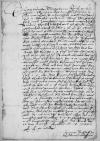So mir Got der almechtig noch VIII iorn(n) vnd V montn(n) widerum(m)b heim hot geholffen(n)
/ vnd zcwischen(n) mir / vnd meynem(m) libn(n) brudern(n) hern(n) Nikolaus Nibschitz (Mikołaj Nipszyc) (*ca. 1483 – †1541), royal courtier, diplomat in the service of Sigismund I and Albrecht von Hohenzollern-Ansbach, Dantiscus' friend; from 1525 until his death an official representative of Duke Albrecht at the Cracow royal court; from 1532 royal secretary; 1519 royal envoy to Albrecht von Hohenzollern, Grand Master of the Teutonic Order, 1525, 1526 envoy to Hungary, 1527 envoy to the Congress in Wrocław, 1531-1533, 1537 envoy to Ferdinand I of Habsburg, 1535-1537, 1540 envoy to Brandenburg, 1536 envoy to the estates of Livonia⌊NibschiczNikolaus Nibschitz (Mikołaj Nipszyc) (*ca. 1483 – †1541), royal courtier, diplomat in the service of Sigismund I and Albrecht von Hohenzollern-Ansbach, Dantiscus' friend; from 1525 until his death an official representative of Duke Albrecht at the Cracow royal court; from 1532 royal secretary; 1519 royal envoy to Albrecht von Hohenzollern, Grand Master of the Teutonic Order, 1525, 1526 envoy to Hungary, 1527 envoy to the Congress in Wrocław, 1531-1533, 1537 envoy to Ferdinand I of Habsburg, 1535-1537, 1540 envoy to Brandenburg, 1536 envoy to the estates of Livonia⌋ vil ist geredt, / ouch gehandelt worden(n), / das E(wren) f(urstlichen) G(naden) zu ehren(n) und zu vil guttenn(n) mocht gereichen(n), / hab ich nicht mocht nochlossen(n), der selbig(en) E(wer) G(naden) mit dissem(m) boten(n) zu schreiben(n) / in hoffnung, dis mein(n) schreiben(n), / so ich noch nicht zu E(wern) G(naden) mich nicht vorfuegen(n) mag, / guttlich von mir werd uffnhemen(n) etc. Ich vorsthe, das die ocht des Holy Roman Empire of the German Nation (Empire, Reich, Imperium)⌊reichsHoly Roman Empire of the German Nation (Empire, Reich, Imperium)⌋ E(wer) G(naden) fast zu herczen(n) geth vnd besverlich ist etc. So wold ich wol, das ich derhalben(n) ein(n) stundlein bey E(weren) G(naden) mocht sein(n). / Vorhoffet mich solchs besvernis vil zu geryngeren(n), / dan(n) ich bin disse zceit her(r) darum(m)b und darbey gewest, / ouch mit den um(m)bgangen(n), die das treiben(n). / Befind nicht, das sich E(wer) G(naden) oder das konigreich Poland (Kingdom of Poland, Polonia)⌊Poln(n)Poland (Kingdom of Poland, Polonia)⌋ derhalbn(n) fast haben(n) zu bekom(m)eren(n), / und ist so wichtig nicht, wie man sich beduncken(n) lest. / Hirum(m)b, so bitt ich E(wer) G(naden), wold derhalbn(n) ein(n) frey und fridlich gemuet haben(n). / Hoth E(wer) G(naden) uff das mol im Holy Roman Empire of the German Nation (Empire, Reich, Imperium)⌊reichHoly Roman Empire of the German Nation (Empire, Reich, Imperium)⌋ nichts mocht ausrichten(n) besiczende die land Prussia, region in central Europe, bordered by Pomerania, Poland, Lithuania and Livonia. From 1466 Prussia was divided into Royal Prussia (Prussia Regalis), which was a part of the Kingdom of Poland, and Teutonic Prussia (Prussia Ordinis Theutonici) – covering the remnants of the former territory of the Teutonic Order’s state in Prussia. In 1525, the Order’s last Grand Master, Albrecht von Hohenzollern, converted to Lutheranism and became the first lay duke in former Teutonic Prussia (dux in Prussia), which from then on was called Ducal Prussia (Prussia Ducalis). At that time, as a result of the treaty of Cracow, Ducal Prussia became a fief of the kings of Poland⌊Preussen(n)Prussia, region in central Europe, bordered by Pomerania, Poland, Lithuania and Livonia. From 1466 Prussia was divided into Royal Prussia (Prussia Regalis), which was a part of the Kingdom of Poland, and Teutonic Prussia (Prussia Ordinis Theutonici) – covering the remnants of the former territory of the Teutonic Order’s state in Prussia. In 1525, the Order’s last Grand Master, Albrecht von Hohenzollern, converted to Lutheranism and became the first lay duke in former Teutonic Prussia (dux in Prussia), which from then on was called Ducal Prussia (Prussia Ducalis). At that time, as a result of the treaty of Cracow, Ducal Prussia became a fief of the kings of Poland⌋, / was sol E(wer) G(naden) svache widerpartey ausrichten(n), / die in Preussen(n) nichts hoth, / do von(n) wir, ab Got wil, / im korczen(n) weiter wollen(n) reden(n). Dis schreiben(n) hab ich allein darum(m)b gethan(n), / das sich in mittler zceit E(wer) G(naden) zu fried gebe, der ich mich thu befhelen(n). Got er almechtig geb derselbig(en) E(wer) G(naden) in glugselig(en) zunemen(n) langwerige gesuntheit. /
 GStA, PK, HBA, C 2, No. 26, f. 1v
GStA, PK, HBA, C 2, No. 26, f. 1v  GStA, PK, HBA, C 2, No. 26, f. 1r
GStA, PK, HBA, C 2, No. 26, f. 1r 
